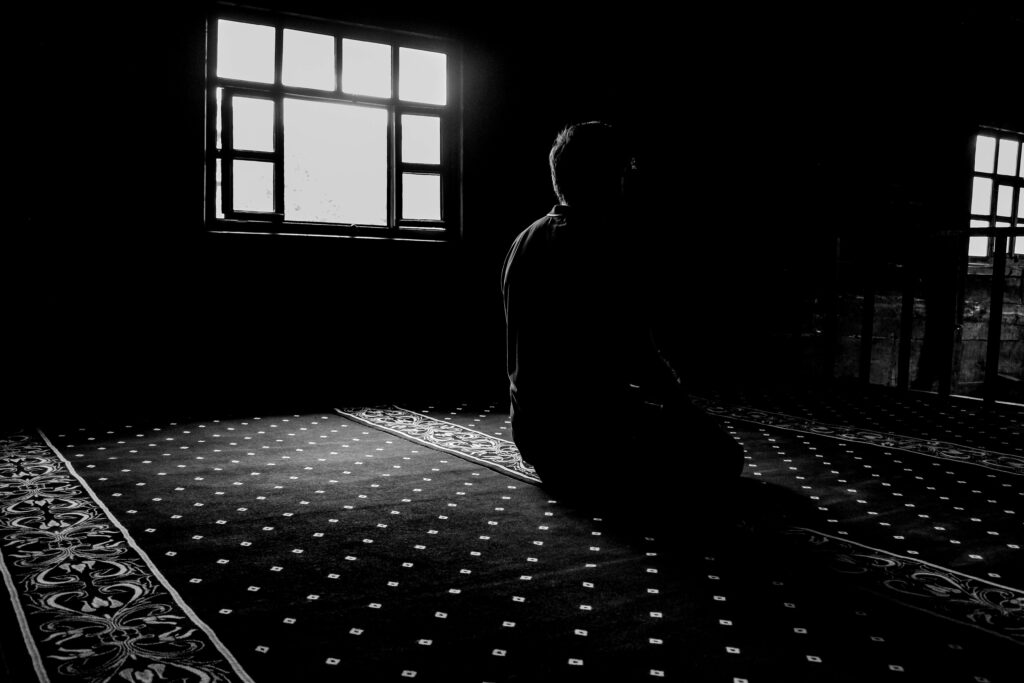Table of Contents
Introduction
The Darood Ibrahimi is more than just a prayer; it’s a profound expression of respect and love for the Prophet Muhammad (PBUH) and his family, mirroring the reverence shown to Prophet Ibrahim (AS). Its recitation is a common practice among Muslims worldwide, serving as a reminder of the interconnectedness of the prophets in Islam’s rich history. This blog explores the Darood Ibrahimi’s depths, offering insights into its significance, variations, and the impact it holds in the lives of the faithful.
The Darood Ibrahimi
اللّٰہُمَ صَلِّ عَلٰی مُحَمَّدٍ وَّ عَلٰٓی اٰلِ مُحَّمَدٍکَمَا صَلَّیْتَ عَلٰٓی اِبْرٰھِیْمَ وَعَلٰٓی اٰلِ اِبْرٰہِیْمَ اِنَّکَ حَمِیْدٌ مَجِیْدٌ اللّٰہُمَ بَارِکْ عَلٰی مُحَمَّد ٍوَّ عَلٰٓی اٰلِ مُحَّمَدٍکَمَابَارَکْتَ عَلٰٓی اِبْرٰھِیْمَ وَعَلٰٓی اٰلِ اِبْرٰہِیْمَ اِنَّکَ حَمِیْدٌ مَجِیْدٌ
Pronunciation: Allahumma salli ‘ala Muhammadin wa ‘ala ali Muhammadin, kama sallayta ‘ala Ibrahima wa ‘ala ali Ibrahima, innaka Hamidun Majid. Allahumma barik ‘ala Muhammadin wa ‘ala ali Muhammadin, kama barakta ‘ala Ibrahima wa ‘ala ali Ibrahima, innaka Hamidun Majid.
O Allah, let Your Blessings come upon Muhammad and the family of Muhammad, as you have blessed Ibrahim and the family of Ibrahim. Truly, You are Praiseworthy and Glorious. O Allah, bless Muhammad and the family of Muhammad, as you have blessed Ibrahim and the family of Ibrahim. Truly, You are Praiseworthy and Glorious.
اے اللہ، محمد ﷺ اور محمد ﷺ کے خاندان پر اپنی برکتیں نازل فرما، جیسے تو نے ابراہیم علیہ السلام اور ان کے خاندان پر برکتیں نازل فرمائیں۔ بیشک تو قابل تعریف اور جلال والا ہے۔ اے اللہ، محمد ﷺ اور محمد ﷺ کے خاندان کو برکت دے، جیسے تو نے ابراہیم علیہ السلام اور ان کے خاندان کو برکت دی۔ بیشک تو قابل تعریف اور جلال والا ہے۔

Historical Background
The Darood holds a venerable place in Islamic tradition, rooted in the Quran and Hadiths. Its origins trace back to the teachings of the Prophet Muhammad (PBUH), who emphasized the importance of sending blessings upon himself and his family, mirroring the respect and love shown to Prophet Ibrahim (AS) and his family. This prayer encapsulates a universal message of peace, blessings, and the interconnection of prophetic lineages, underscoring the unity of monotheistic messages throughout Islamic history.
Significance of Reciting Darood
Reciting the Darood Ibrahimi is not just a matter of spiritual protocol; it’s an act of profound devotion and a means to connect directly with the divine. It serves multiple purposes:
- Spiritual Purification: Reciting this prayer purifies the heart, invoking Allah’s blessings and peace upon the Prophet Muhammad (PBUH) and, by extension, the reciter.
- Intercession: It is believed that sending blessings upon the Prophet (PBUH) earns the reciter his intercession on the Day of Judgment.
- Connection with the Prophet: It fosters a spiritual connection between the reciter and Prophet Muhammad (PBUH), deepening the believer’s faith and commitment to Islamic teachings.
- Universal Blessings: Just as Allah’s blessings are invoked upon Prophet Ibrahim (AS) and his family, reciting the Darood Ibrahimi underscores the universal nature of Allah’s mercy and blessings.
Cultural Impact and Variations
The Darood’s recitation transcends geographical boundaries, with variations observed across different Islamic communities. These variations, though slight in wording or pronunciation, retain the core message of peace and blessings. The practice is deeply embedded in cultural rituals, from daily prayers to significant events like weddings and celebrations of Eid. It symbolizes unity and continuity, linking Muslims to their ancestral faith and each other, irrespective of cultural diversity.
Modern Relevance and Practice
In today’s fast-paced world, the Darood Ibrahimi remains a source of solace and spiritual grounding for Muslims. It is recited in daily prayers, during moments of reflection, and in times of global uncertainty, serving as a reminder of the enduring presence of divine grace. Personal stories abound of individuals finding peace and resilience through its recitation, highlighting its relevance in contemporary spiritual practice.
Comparative Analysis
When compared with other significant Islamic prayers, the Darood Ibrahimi stands out for its universal appeal and deep historical roots. Unlike prayers that may seek specific guidance or assistance, the Darood Ibrahimi is a testament to the unbroken chain of prophetic wisdom, emphasizing the integral role of Prophet Muhammad (PBUH) in Islam’s message of unity and compassion.
5 Pillars of Islam: Essential Practices for Spiritual Growth

Conclusion
The Darood Ibrahimi is more than just words of prayer; it’s a bridge connecting the faithful across time and space, from Prophet Ibrahim (AS) to Prophet Muhammad (PBUH), and to the believers today. Its recitation is a profound act of faith, embodying the essence of Islamic spirituality and communal bonds. As Muslims continue to recite this prayer, they reaffirm their commitment to the principles of love, peace, and unity that are at the heart of Islam.
FAQ Section
What is the Darood Ibrahimi?
The Darood Ibrahimi is a specific Islamic prayer that invokes blessings upon the Prophet Muhammad (PBUH) and his family, paralleling the blessings upon Prophet Ibrahim (AS) and his family. It is a significant part of Muslim prayer rituals and holds great spiritual value.
Why is reciting the Darood Ibrahimi important?
Reciting the Darood Ibrahimi is important for several reasons: it purifies the heart, ensures the intercession of the Prophet (PBUH) on the Day of Judgment, strengthens the believer’s connection to the Prophet, and embodies the universality of Allah’s blessings.
How often should the Darood Ibrahimi be recited?
The Darood Ibrahimi can be recited at any time, but it is especially encouraged during daily prayers, on Fridays, and during personal moments of prayer and reflection.
Can non-Arabic speakers recite the Darood Ibrahimi?
Yes, non-Arabic speakers are encouraged to recite the Darood Ibrahimi in their own language or in Arabic to the best of their ability. The intention and devotion behind the recitation are what truly matter.
Is the Darood Ibrahimi specific to any one sect of Islam?
No, the Darood Ibrahimi is universally recognized and recited across different Islamic sects. Its message of blessings and peace is a unifying aspect of Islamic faith.

